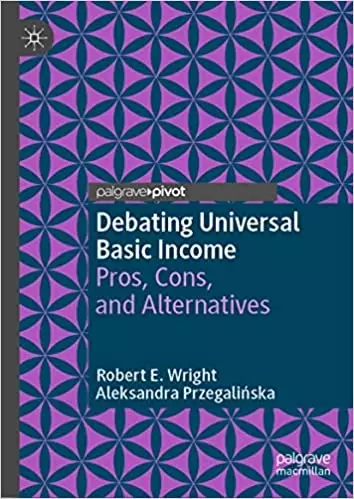Debating Universal Basic Income:
Martin Sandbu
"Debating Universal Basic Income: Pros, Cons, and Alternatives (Exploring the Basic Income Guarantee)", Robert E. Wright
A quick tour of the basic income debate
Robert Wright and Aleksandra Przegalińska offer a quick short tour of the basic income (UBI) debate, writing alternate chapters in favour of and opposed to UBI. They cover arguments from technology, through climate change, funding, social justice, dependency, and autonomy.
The current economic problem is ‘distribution, not production’ (p24), i.e. we can produce the goods and services people need, but are failing to get income to people to purchase them. UBI is better than means-tested benefits because it avoids unemployment and poverty traps (p24), uptake rates are higher (p25), and working hours are constantly reducing (p27). But UBI means expensive big government, whilst welfare fails to reduce poverty, the labour market is distorted, and UBI would decrease GDP! It ‘sounds like communism’ (p36).
Automation is drastically reducing jobs and wage income, so we need UBI (p39-44). But human labour will collaborate with AI, not compete with it. We need the ‘short-term pain’ (p50) of technological unemployment to spur new endeavours. Maybe we need degrowth + UBI to combat climate change (p57-60), but ‘business, economic, and technological change will provide solutions’, rendering UBI unnecessary (p65). Carbon taxes should reduce pollution, not fund UBI (p64). UBI might encourage geographical spread, and population growth (p66). It will reduce work incentives and therefore GDP (p74). Sovereign money creation will ‘not improve macroeconomic outcomes’, and will cause inflation (p75). ‘UBI remains likely to be either socioeconomically inconsequential, or destructive of economic growth’ say the authors, citing no evidence for this claim (p76). Not so – UBI can be funded by tax, other benefit reductions, and by sovereign money (p79-83). UBI enhances social justice, democracy, and autonomy, (p91-94,99), but creates dependency (p95).
The curious conclusion is to delay UBI policy and let other nations implement it first (p106), which clearly cannot apply to all national economies. Other alternatives include a universal basic asset, which would generate huge peak demand in the economy, universal basic services, or job guarantees, all of which have been presented and debated in greater depth elsewhere. The authors’ tentative conclusion is in favour of individual freedom in a market economy, and small government which can fund UBI by reducing current wasted expenditure. (p115-117).
Whilst Wright and Przegalińska provide a comprehensive tour of the UBI debate, their coverage lacks the depth needed to drive conclusions. A wide range of points, often unevidenced, are thrown into the air, with no structure to resolve them. They do however provide extensive references to access deeper debate and research. Their book is an introduction to the debate, rather than the debate itself.
The book is available here.
Geoff Crocker
Editor ‘The Case for Universal Basic Income'
www.ubi.org

